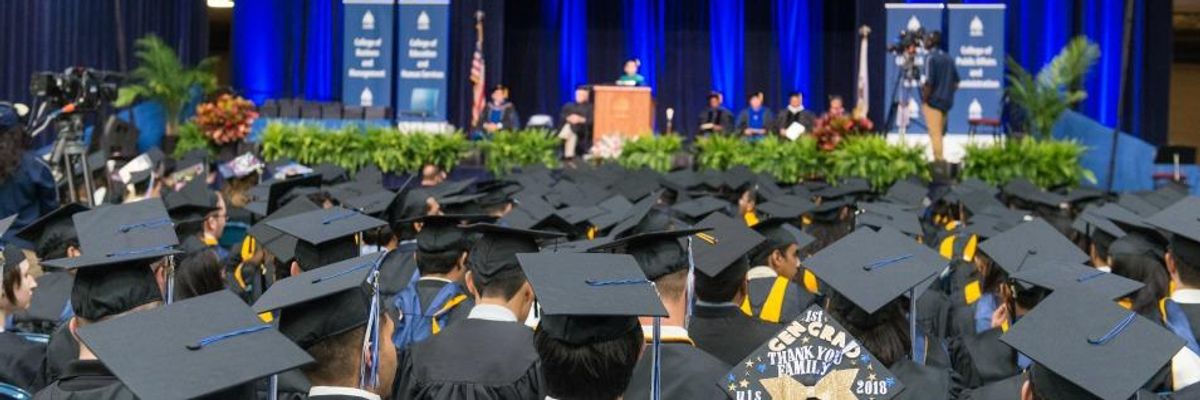More than 350 students across the U.S. have signed up to use their graduation speeches as a call to action directed at lawmakers and older generations, demanding their elders do everything in their power to solve the climate crisis and protect the planet--but many students are facing censorship as they try to get their message out.
Students who joined the Class of 0000 movement planned to give one unified commencement speech at high schools and colleges across the country, demanding that all 2020 political candidates must "have a plan to get to zero emissions, or get zero of our votes."
"A lot of adults blame our generation for being sensitive but we have to deal with the problems they have caused. It's really frustrating. We are vocal about climate change because no one else is going to do anything about it."
--Jessica Lopez, high school graduation speaker"Together, we have the power to solve the climate crisis," reads the speech. "Every student. Every parent. Every teacher. Every leader. The future is in our hands."
But administrators at a number of schools have claimed the message is "too controversial," asking graduation speakers not to bring up the climate in their speeches.
One organizer for Class of 0000 denounced the censorship as "cowardly."
"It's really frustrating that these graduating students are not being able to give one last remark for the school that they contributed so much to," Lia Harel, an organizer on Class of 0000's national planning team, told Common Dreams.
Students in Massachusetts, California, Arizona, and elsewhere have been told they cannot give the Class of 0000 speech--angering students who say their schools have previously been open to protests like the National Student Walkout for gun control reform last year.
"It's shocking to me that we could voice our opinions then, but are silenced when we want to talk about climate change," Jessica Lopez, a senior at Health Sciences High and Middle College toldThe Guardian. "A lot of adults blame our generation for being sensitive but we have to deal with the problems they have caused. It's really frustrating. We are vocal about climate change because no one else is going to do anything about it."
"On this issue, it feels like the adults are the children," Lopez added.
Scientist and organizer Lucky Tran called The Guardian's report "horrific," tweeting that young people should be commended for addressing the climate crisis--an issue that is expected affect people in every corner of the world during today's graduates' lifetime.
Harel told Common Dreams that the campaign was surprised to see schools objecting to the content of the speech.
"When we were developing the speech we made sure that what we were saying was not directly targeting one particular party or saying anything that is blatantly political," Harel said. "All that we're saying is, 'We want a better future.' ...We worked so hard to make sure these words are [words that] everyone can get behind."
Some students whose speeches have been suppressed have still found a way to spread their message to their fellow classmates and families.
Lopez arranged for her classmates to wear badges reading "No Planet B" to their graduation. Harel advised students who were censored to publicize their school's objections to the speech.
"They need to make sure everyone knows what happened," Harel told Common Dreams.
The suppression, she added, will only fuel her generation's outrage as politicians refuse to accept the scientific consensus that humans are contributing to the climate crisis, fail to rapidly curb planet-warming fossil fuel emissions, and block a swift transition to sustainable energy sources.
"Before every revolution the group in power feels threatened, so they do everything they can to censor those who are speaking out," Harel said. "I want the students to understand that the irony is those restrictions are only fueling our fire, our calls for change."
"This is our revolution this time," she added.

